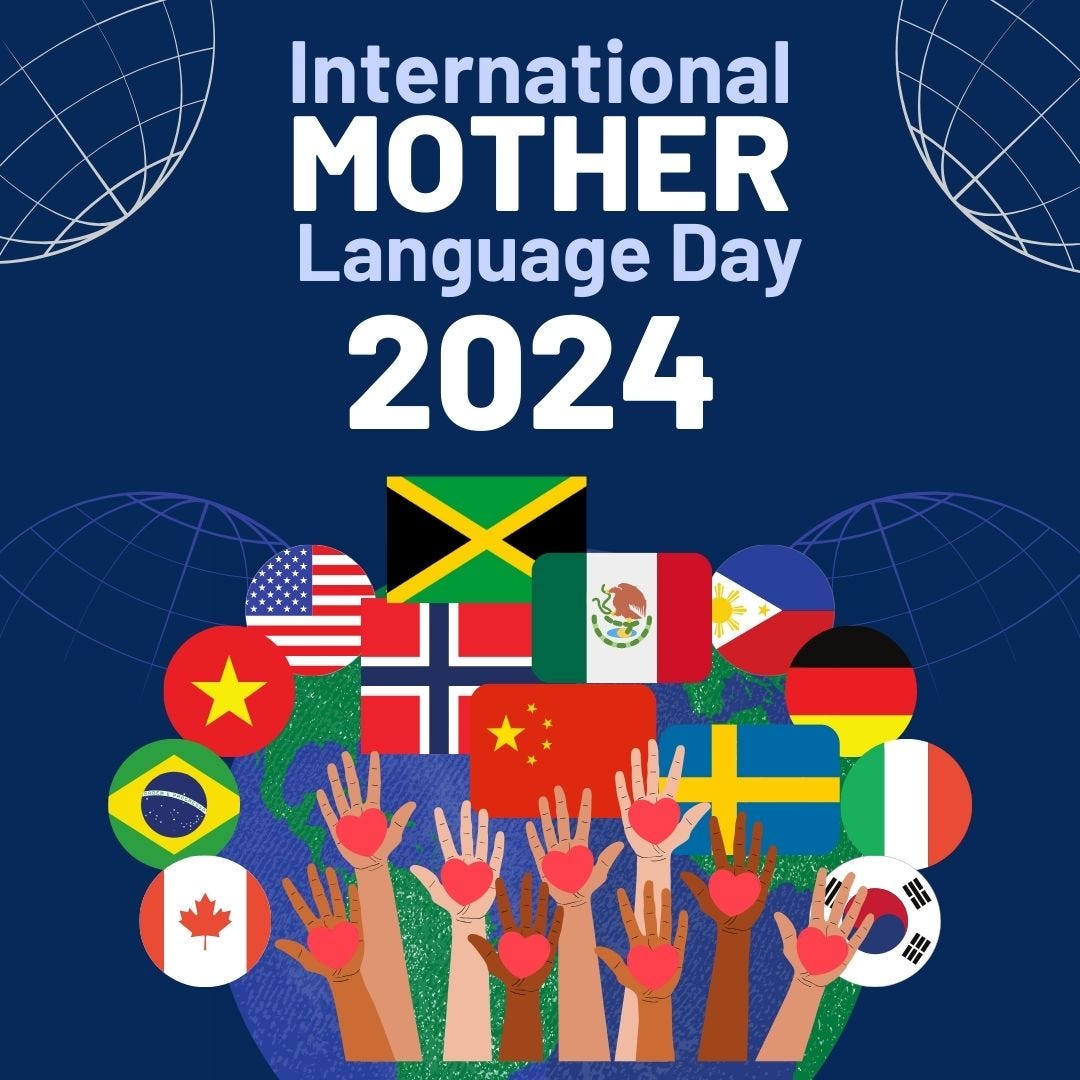International Mother Language Day

Every February 21st, the world celebrates International Mother Language Day, a day dedicated to recognizing and appreciating the immense value of linguistic diversity. This day serves as a powerful reminder that languages are not just tools for communication but vibrant expressions of culture, identity, and heritage.
Our planet boasts a staggering 6,000 languages, each with its own unique history, grammar, and vocabulary. This rich tapestry of tongues reflects the diverse experiences and perspectives of humanity across the globe. From the melodic tones of Swahili to the intricate characters of Chinese, each language carries within it a legacy of knowledge, tradition, and storytelling.
Yet, this incredible diversity faces a growing threat. According to UNESCO, nearly half of the world’s languages are on the verge of disappearing, with an estimated 25 disappearing every year. This loss signifies not only the silencing of unique voices but the erosion of precious cultural heritage and irreplaceable knowledge systems.
Celebrating International Mother Language Day is not merely about acknowledging the beauty of languages. It is a call to action, a reminder of our responsibility to preserve this irreplaceable gift for future generations. Here are some ways we can all contribute to protecting linguistic diversity:
- Embrace your own Mother Language: Speak it at home, share it with others, and actively engage with its literature and cultural expressions.
- Learn a new language: Expanding your linguistic repertoire not only opens doors to new cultures but also fosters empathy and understanding.
- Support endangered languages: Organizations like UNESCO and the Endangered Languages Project offer various ways to contribute to language revitalization efforts.
- Advocate for multilingual education: Encourage schools and institutions to embrace multilingualism and offer opportunities to learn and appreciate diverse languages.
- Engage with media in different languages: Seek out films, music, and literature from various linguistic backgrounds and celebrate their unique artistic expressions.

Why International Mother Language Day Holds Particular Significance in India: A Celebration of Linguistic Diversity
On February 21st, the world unites to celebrate International Mother Language Day. While the value of linguistic diversity resonates globally, this day carries particular significance in India, a land boasting a vibrant tapestry of over 22 official languages and countless dialects. Here’s why:
1. Celebrating Linguistic Heritage: India possesses the second-highest number of languages in the world, each carrying unique cultural and historical significance. From the ancient Sanskrit to the diverse Dravidian languages, these tongues reflect the rich tapestry of India’s past, connecting its people to their ancestral roots and traditions. International Mother Language Day serves as an opportunity to acknowledge and celebrate this profound heritage, reminding us of the invaluable stories and knowledge embedded within each language.
2. Promoting Unity in Diversity: With 22 official languages and hundreds of dialects, India is a diverse mosaic of linguistic identities. This diversity can sometimes translate into challenges, but International Mother Language Day encourages recognizing and appreciating it as a strength. By celebrating each language, we reaffirm our shared identity as Indians while acknowledging and respecting our regional and cultural differences. This fosters unity through diversity, creating a stronger and more inclusive nation.
3. Empowering Marginalized Communities: Many Indian languages, particularly those spoken by smaller communities, face the threat of endangerment due to urbanization, globalization, and the dominance of a few major languages. International Mother Language Day serves as a platform to highlight these marginalized communities and their languages. By advocating for their preservation and promotion, we empower these communities, ensuring their voices and cultural heritage are not forgotten.
4. Enhancing Education and Development: Studies have shown that education in one’s mother tongue enhances learning outcomes, fosters cognitive development, and boosts self-confidence. International Mother Language Day emphasizes the importance of multilingual education in India, encouraging schools and policymakers to create inclusive learning environments that embrace the diversity of languages spoken by students. This paves the way for better educational outcomes and contributes to the overall development of the nation.
5. Preserving Cultural Treasures: Every language is a repository of unique proverbs, poems, songs, and literature that express the collective wisdom and artistic expressions of a community. International Mother Language Day serves as a reminder to safeguard these cultural treasures. By encouraging the documentation, translation, and dissemination of this linguistic wealth, we ensure that future generations can connect with their heritage and appreciate the diverse cultural expressions of their country.
Beyond Commemoration, Action:
Celebrating International Mother Language Day in India shouldn’t be limited to symbolic gestures. It’s a call to action, urging us to:
- Support multilingual education: Advocate for policies that promote mother tongue-based education and support schools in offering diverse language options.
- Learn and appreciate other languages: Go beyond your own mother tongue and engage with other languages spoken in India, expanding your perspective and understanding.
- Promote local literature and art: Support initiatives that preserve and showcase literature, music, and other artistic expressions in various Indian languages.
- Challenge linguistic discrimination: Stand against practices that favor certain languages over others, promoting inclusivity and respect for all linguistic identities.
By actively participating in these efforts, we can ensure that International Mother Language Day truly embodies its ideals in India, fostering a nation where every language thrives and enriches the lives of its diverse communities.
Globally, International Mother Language Day serves as a potent reminder of the richness and fragility of our linguistic heritage. With nearly half the world’s languages facing endangerment, this day emphasizes the need for active preservation efforts. By celebrating diverse tongues, we acknowledge the unique cultural tapestry they represent and their role in safeguarding traditional knowledge systems. This global call to action encourages initiatives like multilingual education, supporting endangered languages, and promoting inclusive media, ensuring equal access to voices and fostering understanding across borders.
In India, however, International Mother Language Day holds particular significance due to the nation’s inherent linguistic diversity. It acts as a celebration of cultural heritage, reminding us of the ancient roots embedded within each language and the unique stories they carry. This celebration of diversity goes beyond mere acknowledgement; it promotes unity and inclusivity. Recognizing and appreciating the multitude of languages spoken in India strengthens the national fabric, creating a cohesive identity while respecting regional and cultural differences.
Beyond mere commemoration, International Mother Language Day urges us to take action.** Supporting multilingual education ensures children learn effectively and connect with their cultural heritage. Engaging with other languages expands our perspectives and fosters empathy. Promoting local literature and art allows diverse voices to be heard and cultural treasures to be preserved. Challenging linguistic discrimination creates a more inclusive society where every language is valued.
Ultimately, International Mother Language Day is not just a single day of celebration; it’s a catalyst for action. It reminds us of our collective responsibility to safeguard the tapestry of languages that enriches our world. By taking proactive steps both globally and locally, we can ensure that future generations inherit a diverse linguistic landscape where every voice resonates and every culture thrives.
Remember, your voice has the power to make a difference! Let’s not only celebrate International Mother Language Day but also take concrete steps throughout the year to ensure that the unique melody of every language continues to enrich our lives and inspire future generations.
Resources:
- https://www.hindustantimes.com/lifestyle/festivals/international-mother-language-day-2024-date-history-and-significance-101708412049670.html
- https://www.moneycontrol.com/news/trends/international-mother-language-day-2024-date-history-and-significance-12316921.html
- https://www.indiatvnews.com/lifestyle/news/when-is-international-mother-language-day-2024-know-date-history-significance-and-more-2024-02-21-917846
- https://www.unesco.org/en/articles/international-mother-language-day-why-multilingual-education-key-intergenerational-learning
- https://www.thehindu.com/life-and-style/on-the-occasion-of-mother-tongue-day-scholars-allay-fears-of-the-telugu-language-diminishing-from-promoting-regional-languages-in-educational-curricula-to-creating-spaces-for-telugu-content-in-the-dig/article67866089.ece
For more news: https://waddupindia.in/




5 thoughts on “International Mother Language Day 2024 Celebrations Worldwide & Significance”
Can you be more specific about the content of your article? After reading it, I still have some doubts. Hope you can help me.
Your article helped me a lot, is there any more related content? Thanks!
Your point of view caught my eye and was very interesting. Thanks. I have a question for you.
Can you be more specific about the content of your article? After reading it, I still have some doubts. Hope you can help me.
Can you be more specific about the content of your article? After reading it, I still have some doubts. Hope you can help me. https://accounts.binance.com/en-ZA/register?ref=B4EPR6J0